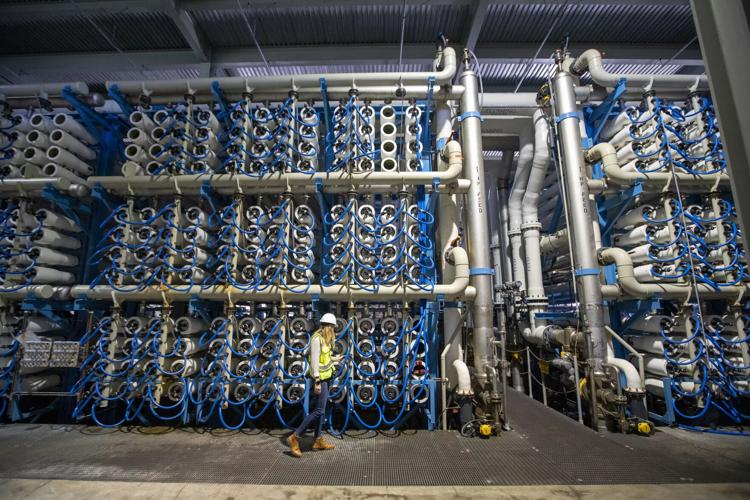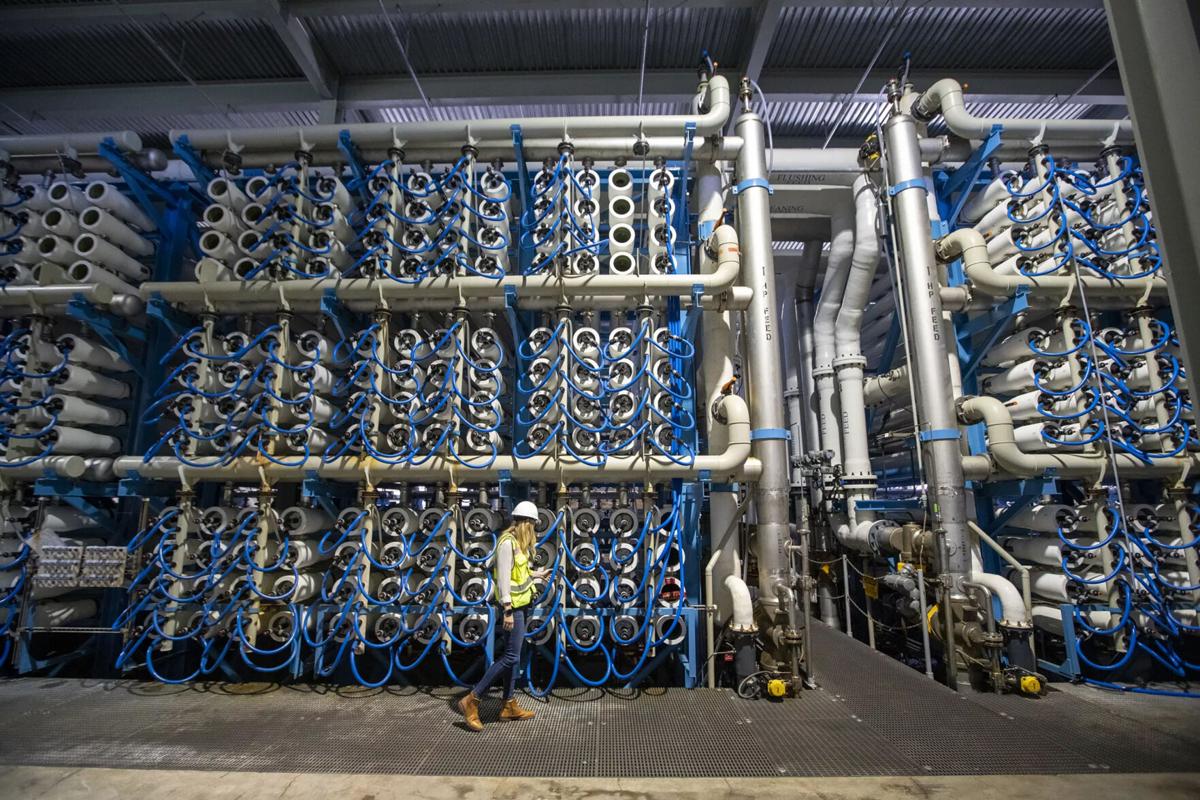Tucson Assistant City Manager Tim Thomure joined a unanimous vote last month by a state water board that will allow for state-run discussions with an Israeli firm over its proposal for a $5.5 billion desalination plant in Puerto Peñasco on the Gulf of California.
The Water Infrastructure Authority of Arizona voted 9-0 on Dec. 20, following a fierce, afternoon-long debate, to authorize its staff to prepare an analysis of the project. If the analysis finds the proposal meets state requirements, the board chairman can negotiate an agreement with the company to deliver desalted water to Arizona at agreed upon terms including costs.
During the discussion of the plant at that meeting Thomure, a member of the water authority board, raised a number of questions and concerns about the project. They included its costs’ impacts on local water ratepayers and its environmental effects.
But after the vote, Thomure told the Star he supported the resolution to enable authority staff to evaluate IDE’s proposal and then relay its analysis to the authority’s Long-term Water Augmentation Committee and, ultimately, to the board. Appointed last year by since-departed House Minority Leader Reginald Bolding, Thomure votes as an independent board member — not representing the City of Tucson, he and Mayor Regina Romero told the Star.
But Tucson Vice Mayor Steve Kozachik and Councilman Kevin Dahl blasted the desalination plant proposal in interviews, following the water board’s vote, as fiscally and environmentally unsound. The mayor said she had “many questions, including environmental concerns,” adding she hasn’t seen the formal IDE proposal.
“I am outraged. This is the wrong way to go for water policy in Arizona. The cost in energy, the environmental damage, the financial costs are all outrageous,” Dahl said.
Speaking of the energy needed to desalinate the water and to pump the water uphill from Puerto Peñasco to the CAP canal north of Gila Bend, Dahl said, “It sounds like a pipe dream.”
Kozachik called the plant proposal, “One of the dumbest ideas I’ve seen, from a standpoint of costs and environmental impacts.
“We need to be talking about conservation. The money it will take to purchase the land and construct it; the costs are astronomical,” he said, although much of the pipeline’s U.S. section will run through land already owned by the government.
But Thomure said, in explaining his vote, “The board does not have sufficient information to evaluate the proposal at this time — the information is solely provided by the applicant — and a staff report is the prudent next step.”
Since board members have not yet established policies and procedures for processing desalination proposals, authority staff would have been precluded from engaging with IDE to evaluate the proposal and transmit that analysis to the board without a resolution authorizing that, he said.
“By passing the resolution, we have assured that a transparent, public process will be conducted to evaluate and discuss this proposal,” Thomure said.
Drought-proof water supply
The Israeli proposal calls for building a plant large enough to desalinate up to 1 million acre-feet of water per year. That’s about as much as the Central Arizona Project canal system delivers to Arizona annually from the Colorado River. The water would then be shipped via a 200-mile-long pipeline to the Hassayampa River Basin west of Phoenix. There, it would be placed into the 336-mile-long, CAP canal for delivery to Phoenix, Pinal County, Tucson and ultimately to Nogales via a proposed extension of the canal.
But at the Dec. 20, water board meeting, and at a subsequent legislative hearing, some legislators and several environmentalists and other critics of the plant proposal complained it was being rammed through the approval process much too fast.
Supporters of the plant said it’s time to get going on it now, because it will take many years for its proponents to obtain all the government permits needed to build it. With both groundwater and Colorado River supplies now being depleted, plant supporters see seawater as the only drought-proof, reliable water supply available.
Many critics noted that a state law, passed last spring, that gave the board authority to approve and finance desalination projects using a new, $1 billion appropriation, contained provisions requiring that the approval process for such projects be transparent. Because IDE officials and their partners in the project had met with officials of numerous state and federal agencies and some local water officials in the past, critics said the entire process smacked of a backroom deal.

Thomure
But the authority board’s Dec. 20 resolution “exactly addresses” the public concerns that until the previous week, “the project was only known to some (not including myself),” Thomure said in reply to such criticism.
“The resolution outlines the public and transparent process to evaluate the proposal — so that there is ‘adequate public scrutiny,’” he said.
Need for conservation ignored
Thomure’s questioning of a top IDE official about the plant’s impact on water rates produced one of the more noteworthy exchanges of the five-hour board meeting Dec. 20.
The plant’s estimated cost of $2,200 to $3,300 per acre-foot of water — far more than what’s charged by CAP or by city water utilities — would only add a few dollars a month to a typical water bill of $38 a month for 10,000 gallons, Erez Hoter-Ishay, the IDE project’s team leader, told the board.
“It goes up to $43-$44-$45. This is for the security of the water,” he said.
Thomure, however, got Hoter-Ishay to acknowledge that if a water utility had no other source of water besides desalinated seawater, its customers’ monthly water bills would double.
“The people of Phoenix get water from different resources, whether it’s groundwater or CAP or others. But yes, if you have no source of any other water, no groundwater, no water from CAP, for example, that will be your price,” Hoter-Ishay said.
That and other concerns remain, “and the next steps of evaluation need to consider those concerns, and the concerns expressed by other members of the board and the public,” Thomure told the Star afterward.
The board’s resolution “did not approve the project in any manner. The resolution created an open, public process for staff, the committee, the board, and the public to evaluate and discuss the project,” Thomure said.
Kozachik called the proposal a “fool’s errand.”
The focus has got to be on significant conservation efforts. We’re just ignoring the fact that at some point, whether it’s your generation and mine or the next one; someone is going to have to face the fact that you can’t continue to grow uncontrollably and ship water in from out of state. That’s absurd,” the midtown councilman told the Star.
Dahl denounced the idea of having a private, foreign country building a multi-billion-dollar plant whose financing would be backstopped by state tax dollars. The company wants Arizona to guarantee that it will use already appropriated state funds to pay some of the water costs charged to customers, if cities and other entities don’t buy enough of the water to pay back the construction tab.
“The privatization of water is one of the worldwide problems we really need to monitor. Do we want corporations making decisions about our precious water supply.” Dahl asked. “If they do, they make crazy decisions for a billion-dollar plant.”
Longtime Arizona Daily Star reporter Tony Davis talks about the viability of seawater desalination and wastewater treatment as alternatives to reliance on the Colorado River.






